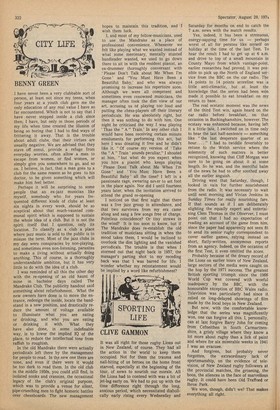CLIVE GAMMON
It was all right for those rugby Lions out in New Zealand, of course. They had all the action in the world to keep them occupied. Not for them the trauma and nail-biting of us heroes on the home front starved, especially at the beginning of the tour, of news to nourish our morale. All • the Lions had to contend with was a bit of jet-lag early on. We had to put up with the time difference right through the long, anxious period, which necessitated diabolically early rising every Wednesday and
Saturday for months on end to catch the 7 a.m. news with the match results.
Yes, indeed, it has been a strenuous, energy-sapping time for us — perhaps worst of all for persons like myself on holiday at the time of the last Test. To hear the result I had to get up at 6 a.m. and drive to top of a small mountain in County Mayo from which vantage-point, earlier researches had proved, it was possible to pick up the North of England service from the BBC on the car radio. The 14 points to 14 points scoreline was a little anti-climactic, but at least the knowledge that the series had been won made it possible to eat breakfast on my return to base.
The real ecstatic moment was the news of the third Test win, again heard on the car radio before breakfast, on that occasion in Buckinghamshire, however. The ecstasy was enhanced because, having left it a little late, I. switched on in time only to hear the last half-sentence — something like "the last desperate quarter of an hour.... " I had to twiddle feverishly to retune to the Welsh service where the solemnity of such matters is better recognized, knowing that Cliff Morgan was sure to be going on about it at some length. So he was, and the merciful balm of the news he had to offer soothed away all the earlier anguish.
Driving west that Saturday, though, I looked in vain for further nourishment from the radio. It was necessary to wait until next morning and Vivian Jenkins in Sunday Times for really nourishing fare. If that sounds as if I am deliberately slighting the equally expert and entertaining Clem Thomas in the Observer, I must point out that I had no expectation of reading an account of the game from him, since the paper had apparently not seen fit to send its senior rugby correspondent to cover earlier games, relying instead on short, flatly-written, anonymous reports from an agency. Indeed, on the occasion of the first Test, it even omitted the score.
Probably because of the dreary record of the Lions on earlier tours of New Zealand, large sectors of the media were caught on the hop by the 1971 success, The greatest British sporting triumph since the 1966 World Cup was covered with woeful inadequacy by the BBC, with the honourable exception of BBC Wales radio. Television was particularly bad since it relied on long-delayed showings of film made by the local boys in New Zealand.
But now, with the comfortable knowledge that the series was magnificently won, one can forgive all this. I, personally, can at last forgive Barry John for coming from Cefneithen in South Carmarthenshire, a grisly village where they know a lot more about rugby than a lick of paint and where for six miserable weeks in 1941 I was an evacuee.
And forgiven, but probably never forgotten, the extraordinary lack of sportsmanship, on the evidence of television, of New Zealand rugby followers at the provincial matches, the groaning, the boos, the silences in the face of marvellous rugby. It could have been Old Trafford or Ibrox Park.
We won, though, didn't we? That makes everything all right.


































 Previous page
Previous page